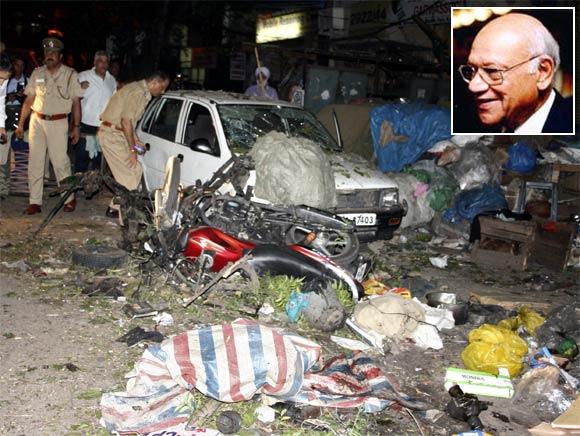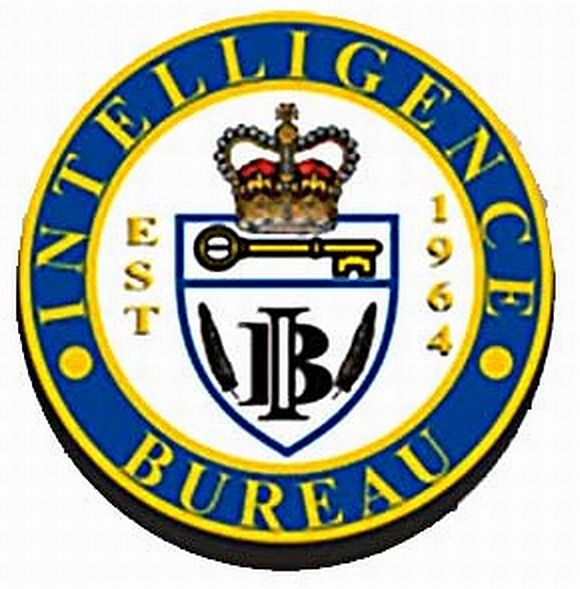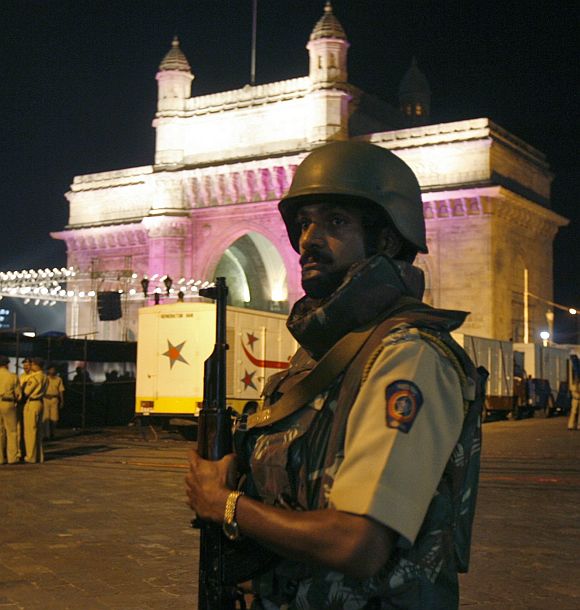
Julio Ribeiro, the Mumbai police chief who sprang to superstardom after leading the Punjab Police during the Khalistan insurgency, has experience with both state-level and counterterrorism policing. And he is doubtful whether the National Counter-Terrorism Centre is really needed.
The problem, he tells Sanjay Jog, is not one of legislation but one of implementation and effectiveness. Edited excerpts:
The Centre and states by and large have taken opposing stands on the NCTC. What is your view?
The government keeps on increasing the number of organisations whenever it is faced with terrorist strike or abduction. It's a knee-jerk reaction -- they form another body.
I do not think we require so many bodies, including the proposed NCTC. Now there is a National Investigation Agency even. What is required is will -- only then are the laws implemented.
After 26/11, the government immediately decided to form one unit of National Security Guard in Mumbai, which is fine. But we already have an Anti-Terrorism Squad and the Special Investigation Team. There are so many squads that impinge on each other's turf and territory. They often quarrel; each one wants the best officers.
The crime branch used to be quite an effective set-up; strengthening it would be quite helpful.
What we do require is proper co-ordination between the Centre and states. For example, the Central Bureau of Investigation could co-ordinate this whole effort.
I am of the opinion that the organisations already there on the ground should be properly used. The main problem in our country is they do not implement the law. There are so many laws; immediately something happens and they try to set up some new body or bring in a new law without effectively enforcing the old laws.
Please ...

People still remember what you did in Punjab.
I took a decision to go after terrorists and my strategy was a success, as the terrorists did not expect the police to go after them. When we started there, the terrorists had a few setbacks.
However, very soon the terrorists regrouped, replaced their cadre and reworked their plan: they started targeting Hindus. We increased our forces, dispersed them, and called for more force. Go after the terrorists, use intelligence properly -- K P S Gill was quite good at it.
Terrorism is a much bigger phenomenon than terrorists. Terrorists could be eliminated, but they can be replaced. So we have to take the community on our side, and that was the more difficult task.
But we used to go to the villages and tell them how Sikhs are great fighters and no religion teaches you to kill innocent people. Ultimately, Sikh and Jat farmers came together against terrorists -- especially because criminals' involvement in terrorism increased, as did their interfering with women.
Then came 26/11. Could that have been averted?
26/11 could not have been stopped by the Mumbai police or the Maharashtra police. This required much higher-level intelligence, which I think was available but was not properly disseminated and not properly understood -- and that was the problem.
However, that can be done by the Centre as it requires a lot of expertise and a lot of money.
At the state level, what is required is "human intelligence", especially to detect explosives in trains and at bus stops. You require police to be friendly with the people -- more trust. In England, for example, the bobbies are respected by the people.
Our whole culture is different. We think we are superior in some way; the leadership has to address this. How do you change that mindset? People don't have confidence in the police.
After 26/11 I met the prime minister with a suggestion to take the Muslim community into confidence. 26/11 could not have happened without the involvement of locals who, incidentally, belonged to the Muslim community -- the suspicious movement of terrorists, the purchase of explosives, the selection of sites will tell you that. Local people will tell you about the plans if they are taken into confidence.
However, they do not trust the police and the anti-terrorist machinery. My Mohalla Committee Movement tries to address this issue. The government should put good police officers who can regularly interact with Muslim and other communities and try to create trust.

States are opposed to providing wide-ranging powers to the Intelligence Bureau to arrest.
The Intelligence Bureau has a totally different type of job: gathering information. In Punjab, the government asked me whether I would mind if an official from the IB was sent. I was quite happy. The IB officer was very good; he had so much information.
The IB should co-ordinate with states. If you want to strengthen the present organisation, do it. But by forming an NCTC, a new bureaucracy is created. This is my opposition even to Lokpal. You will create a huge bureaucracy. You won't be able to manage it.
NCTC is not required. Improve whatever is there on the ground, get them to act, and co-ordinate. Today the IB keeps a low profi#8804 it operates from an unknown place. Co-ordination between the central and state governments is required. You already have an NIA. I really do not want what they want to do by setting up the NCTC and by giving the IB powers to arrest.

You have been quite vocal on police reforms. Are you satisfied with their present status?
After a Supreme Court order, a committee headed by me held wide-ranging discussions and made several suggestions on police reforms. However, no state government wants reforms; they do not want to part with powers of patronage, of appointing people.
There are people in every state who are competent, not corrupt, but they are not appointed due to the interest of those sitting in the government. They worry about caste and community during making appointments. But what about the people being policed -- they do not bother about caste and community, what they want is security of their lives and property.
A funny thing has happened in Maharashtra. Following Anna Hazare's agitation, the state government here passed a law saying police transfers could only happen after three years.
They might be up to mischief, but they cannot be moved; a corrupt or an inefficient officer cannot be replaced before completion of three years.
Persons appointed to key posts should be given operational independence. However, now it is observed that appointments are done based on what the minister wants, what the party wants. This is what people cannot accept any more.
More and more people should be involved in such an exercise so that people of integrity are appointed at right posts and there won't be political interference.
People should take the risk of becoming unpopular by this movement: no interference in transfers, promotions and punishments. Let it be left to the chiefs concerned. If such kind of interference were there in the postings to be made by the army chief, we would lose every war.
...